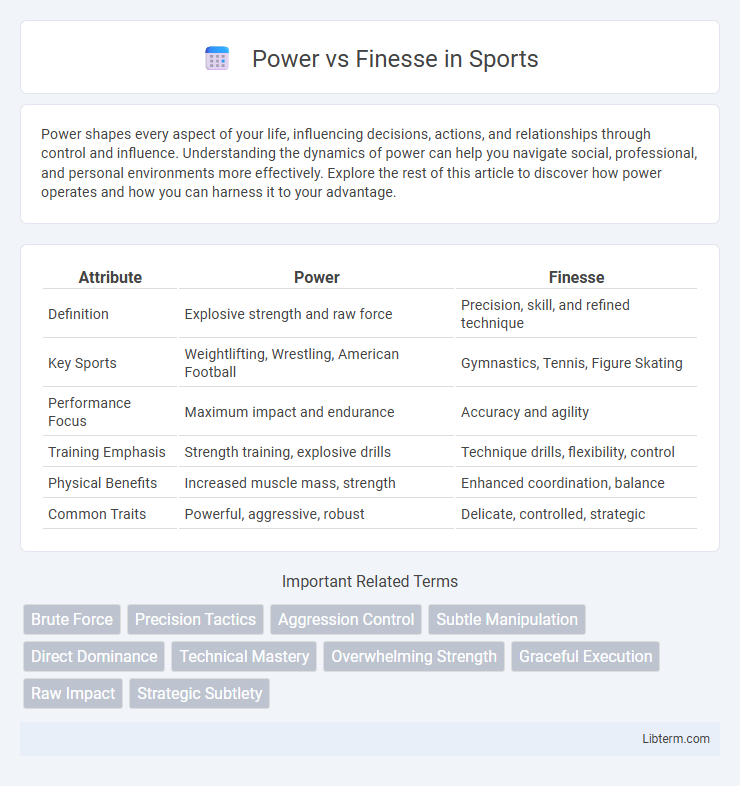Power shapes every aspect of your life, influencing decisions, actions, and relationships through control and influence. Understanding the dynamics of power can help you navigate social, professional, and personal environments more effectively. Explore the rest of this article to discover how power operates and how you can harness it to your advantage.
Table of Comparison
| Attribute | Power | Finesse |
|---|---|---|
| Definition | Explosive strength and raw force | Precision, skill, and refined technique |
| Key Sports | Weightlifting, Wrestling, American Football | Gymnastics, Tennis, Figure Skating |
| Performance Focus | Maximum impact and endurance | Accuracy and agility |
| Training Emphasis | Strength training, explosive drills | Technique drills, flexibility, control |
| Physical Benefits | Increased muscle mass, strength | Enhanced coordination, balance |
| Common Traits | Powerful, aggressive, robust | Delicate, controlled, strategic |
Understanding Power and Finesse: Core Definitions
Power refers to the ability to exert force or influence with strength and impact, often emphasizing raw physical capability or intensity. Finesse involves skillful precision, subtlety, and careful technique to achieve a desired effect, highlighting control and elegance in execution. Understanding power and finesse requires recognizing their distinct roles in performance, where power drives forceful action and finesse ensures nuanced effectiveness.
Historical Perspectives: Power and Finesse in Action
Historical perspectives reveal power as a driving force in military conquests and empire-building, exemplified by figures like Alexander the Great and the Roman legions. Finesse emerges in strategic diplomacy, artistic craftsmanship, and intellectual achievements, seen in Renaissance masters and Enlightenment thinkers. The dynamic interplay between power and finesse shaped political landscapes and cultural evolution across civilizations.
The Role of Power in Achieving Success
Power plays a crucial role in achieving success by enabling individuals to influence decisions, mobilize resources, and assert authority in competitive environments. Effective use of power can accelerate goal attainment by overcoming obstacles and driving strategic initiatives. Mastery of power dynamics enhances leadership capabilities, leading to sustained organizational impact and personal achievement.
Finesse: The Subtle Art of Influence
Finesse embodies the subtle art of influence, leveraging nuanced communication and emotional intelligence to navigate complex social dynamics effectively. This approach prioritizes strategic persuasion and empathy over brute force, enabling long-term relationship building and conflict resolution. Mastery of finesse often results in sustainable leadership and collaboration, as it harnesses insight and adaptability to achieve desired outcomes.
Power vs Finesse: Key Differences and Similarities
Power emphasizes raw strength and force, often leading to high-impact, explosive results, while finesse relies on skill, precision, and control to achieve subtle, refined outcomes. Both qualities can coexist in effective performance, with power providing momentum and finesse ensuring accuracy and technique. Understanding their interplay is crucial for optimizing performance in sports, arts, and various professional fields.
Situational Appropriateness: When to Use Power or Finesse
Power is most effective in situations requiring decisive, forceful actions such as physical challenges or competitive scenarios demanding strength. Finesse excels in contexts needing precision, subtlety, and strategic thinking, like negotiations, delicate problem-solving, or artistic endeavors. Evaluating the environment and desired outcomes determines whether leveraging brute force or refined skill yields optimal results.
Psychological Impacts: How Power and Finesse Affect Others
Power exerts a strong psychological impact by instilling dominance and control, often leading to compliance or fear in others, while finesse influences through subtlety and emotional intelligence, fostering trust and cooperation. The perception of power can trigger stress responses, reducing creativity and open communication, whereas finesse promotes empathy and resilience, enhancing social bonds. Understanding these dynamics allows individuals to choose strategies that align with desired psychological outcomes in leadership and interpersonal relationships.
Power and Finesse in Leadership Styles
Power in leadership emphasizes authority, control, and the ability to enforce decisions, often driving results through command and influence. Finesse in leadership involves subtlety, emotional intelligence, and strategic communication to inspire and motivate teams collaboratively. Effective leaders balance power with finesse to adapt to diverse situations and foster sustainable organizational success.
Building a Balanced Approach: Integrating Power and Finesse
Balancing power and finesse in any skill involves combining strength with precision to maximize effectiveness. Integrating explosive force with refined technique enhances performance by ensuring controlled, deliberate movements that minimize errors. Developing a training regimen that alternates between power drills and finesse exercises promotes a harmonious approach, optimizing overall capability and adaptability.
Real-World Examples: Lessons from Power-Finesse Dynamics
The dynamic between power and finesse is exemplified in sports such as tennis, where players like Serena Williams combine powerful serves with precise shot placement to dominate matches. In business, companies like Apple demonstrate finesse through innovative design and user experience while leveraging the power of brand loyalty and market influence. Understanding how power can drive impact and finesse can refine strategies that balance strength with subtlety for optimal results.
Power Infographic

 libterm.com
libterm.com